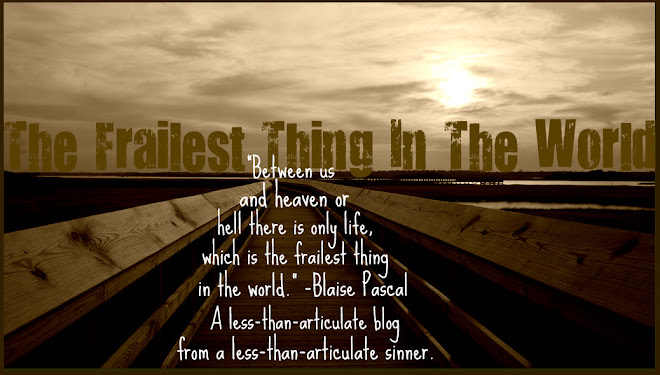Psalm 88 is beautiful, because it speaks of a saint who is struggling yet calls out to God, even in the depth of his anguish. Int he midst of suffering, faith holds on to the God who has promised His presence and to deliver us.
In verses 3-5, the psalmist points out that "his soul" was "full of troubles", and that he feels almost dead in the midst of his life filled with suffering, even going so far as to indict God for not intervening and fixing the issue.
What struck me about this Psalm, was that the writer never stopped turning to the Lord, despite frustration with his circumstances. True faith is not an apathetic acceptance of whatever comes to pass in our lives. True faith lies in wrestling with God in prayer. We should be concerned when things in our lives don't appear to be right. Jesus poured out his heart in prayer in Gethsemane, asking for another way. When we question if there is another way for us in faith, we're simply following the master's path outlined for us.
Psalm 88, a lament in structure, appears to end with sadness, but if we look at the psalm as a whole, it isn't. The psalm begins with talking to "the God who saves." The Bible doesn't offer a sanitized version of life
or our reactions to it: dark, shocking, and painful stories abound. Scripture shows us people who think, act, plan, decide, and speak
just like we do. If the Bible left out these real-life stories of murder,
rape, famine, disease, judgment, depression, war, adultery, theft, corruption,
and overwhelming fear, how likely would we be to believe that God’s Word
could help us?
It is reassuring to realize that the Bible addresses the world as we know it. God makes it very clear that he understands the Heat we face every day. It isn't always pleasant to read the honest stories of Scripture, but it is
comforting. We realize that we will never face an experience, no
matter how dark or difficult, that would be a shock to our God. Again, Paul David Tripp says it so well: "The hope and help God offers his children reflect his
knowledge of the full range of human experience. That’s why some of the most comforting passages of Scripture may not even have the word comfort in them."
Or when Timothy Lane states that “The Lord of light is your friend in
darkness. The Lord of life stands beside you in death. The Lord of hope is your
companion in your despair. The Prince of Peace supports you when no peace can
be found. The God of all comfort waits faithfully near you. The source of all
joy is close by when loss has robbed you of joy.”
The reality is that God doesn't prescribe a happy life and depression is a form
of suffering that can’t be reduced to one universal cause. It's not as easy as finding the root cause and offering some silver bullet. Mental illness is challenging and may be life long. This means that family and friends can’t rush in armed with
THE answer. Instead, they must be willing to postpone swearing allegiance
to a particular theory, and take time to know the depressed person and work
together with him or her. from a pastoral standpoint, this means working for the spiritual wellness of the individual by helping them live their life to the glory of God, even while suffering. Working towards total wellness (body, soul, and spirit) is the goal, but it may not be possible this side of eternity. Our goal is to use all of the wisdom, knowledge, and help that God has made available to us in common grace to help each individual to honor God.
Depression is hard to understand and feels private and isolating and it is common for spiritually mature men and women who feel depressed to think they are doing something wrong. Scripture is filled with words of joy and individuals with happy hearts, so it's easy to feel as if something is amiss.
Ed Welch speaks well to this stating, "When [Christians] aren't feeling happy, they feel that they must be missing something or that God is punishing them until they learn some hidden lesson. On earth, however, God doesn’t prescribe a happy life. He doesn't legislate emotions. Look at some of the Psalms. They are written by people of great faith, yet they run the emotional gamut. This one even ends with “darkness is my closest friend” (Psalm 88:18). When your emotions feel muted or always low, when you are unable to experience the highs and lows you once did, the important question is, “Where do you turn—or, to whom do you turn?””
Why is this so important? Because who you turn to first, reflects who you believe holds ultimate help. But if all truth is God's truth, then utilize the resources at hand to get the help that you need, thanking God and seeking Him all the while. After all, we believe that all good things come from Him and that also that He loves all of His children. Those two ideas never conflict.
